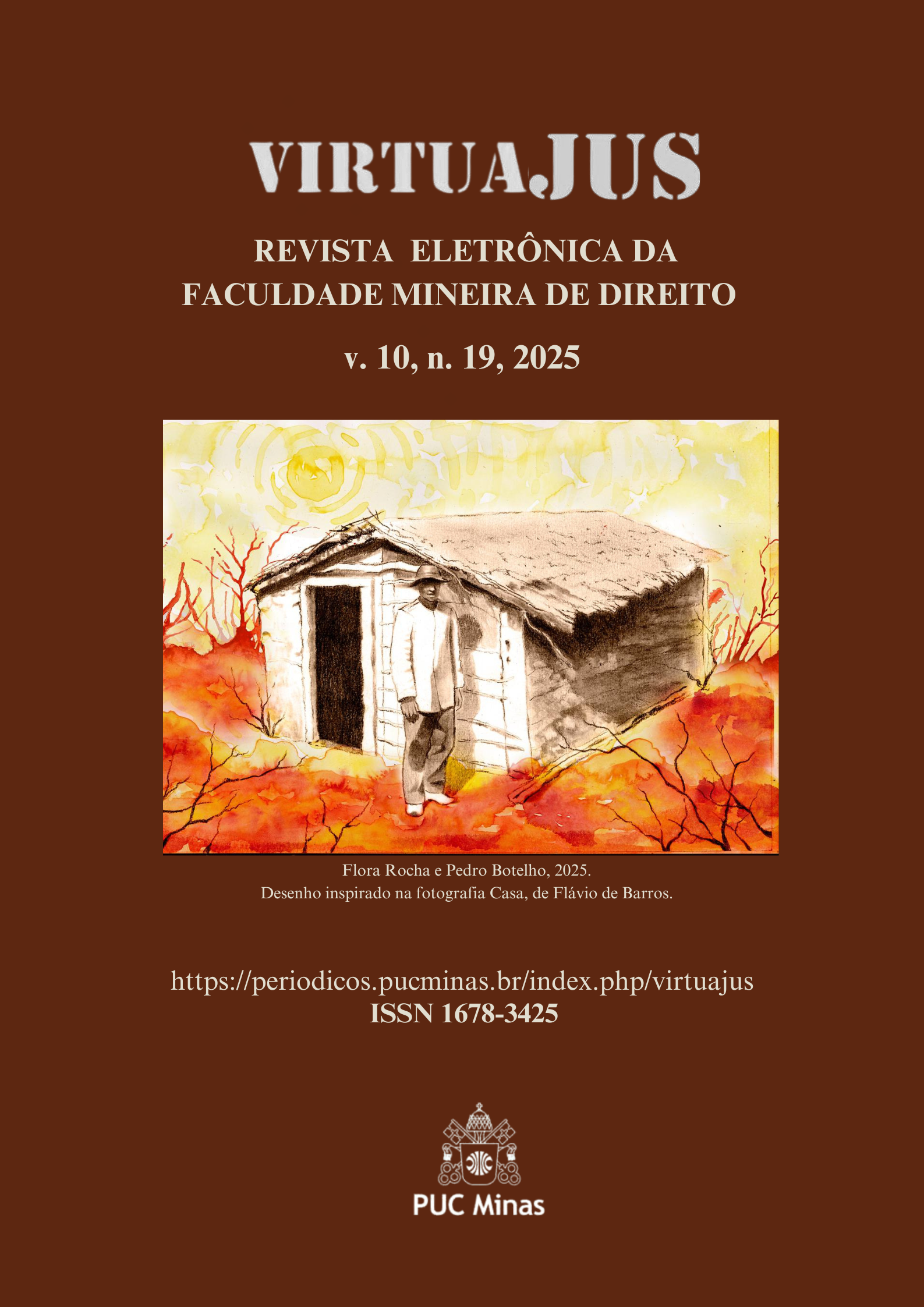The impact of the constitutionality block on the normative plan for social protection for workers in Brazil
Keywords:
Federal Constitution, Constitutionality block, Extraordinary Appeal, Social JusticeAbstract
The 1988 Constitution plays a fundamental role in the defense of social and labor rights in Brazil by establishing a broad set of principles and specific guarantees for the promotion of social justice and human dignity. This study focuses on the analysis of the concept of “constitutionality block” within the scope of abstract normative control, allowing the recognition of norms with a constitutional nature and force outside the text of the Federal Constitution. The article explores Extraordinary Appeal 999.435, judged by the Federal Supreme Court in 2022, which ruled that prior mandatory union intervention is a necessary requirement for mass layoffs, emphasizing the importance of protecting labor rights. The study started from the following research question: What is the legal impact of the concept of constitutionality block in safeguarding social and labor rights in Brazil in light of the recent decision of the Federal Supreme Court related to union intervention in mass layoffs? The methodology is based on an interdisciplinary study and involves aspects of labor law, constitutional law, and human rights, using inductive and deductive reasoning, in qualitative research, with documentary, bibliographic, and legislative analysis. It is concluded that the concept of a constitutionality block plays a relevant role in ensuring the effective protection of citizens' fundamental rights, with an emphasis on the defense of social and labor rights, promoting a dynamic interpretation of the Constitution in the labor context.
Downloads
References
ANDRADE, Amanda Martins Rosa. Crises do Estado e Direito do Trabalho. Editora LTR, 1ª edição, 196 p., ISBN 9788530101091, 2020.
BARROSO, Luís Roberto. A Constituição aberta: interpretação conforme a Constituição. 2. ed. São Paulo: Saraiva, 2009.
BARROSO, Luís Roberto. Interpretação e aplicação da Constituição: Fundamentos de uma dogmática constitucional transformadora. 5. ed. São Paulo. Saraiva. 2003.
BOBBIO, Norberto, 1909. A era dos direitos. Tradução Carlos Nelson Coutinho; Apresentação de Celso Lafer. Nova ed. 7ª reimpressão Rio de Janeiro: Elsevier, ISBN 10: 85-352-1561-1. 2004.
BOBBIO, Norberto. Teoria do ordenamento jurídico. 10. ed. São Paulo: Editora Edipro, 1992.
BRASIL. Consolidação das Leis do Trabalho (1943). Consolidação das Leis do Trabalho. Brasília, DF: Senado Federal, 1943.
BRASIL. Constituição (1988). Constituição da República Federativa do Brasil. Brasília, DF: Senado Federal, 1988.
BRASIL. Supremo Tribunal Federal. Recurso Extraordinário 999.435. Relator: Ministro Edson Fachin. Brasília, 8 de junho de 2022.
CONSELHO DA EUROPA. Carta Social Europeia: revista. Estrasburgo: Conselho da Europa, 2010.
GOMES, Ana Virginia Moreira. A aplicação do princípio protetor no direito do trabalho. LTr: São Paulo, 2001.
GUERRA FILHO, Willis Santiago. Direitos fundamentais, processo e princípio da proporcionalidade. In: PEREIRA, Ana Cláudia Távora et al. (Coords.). Dos direitos humanos aos direitos fundamentais. Porto Alegre: Livraria do Advogado, 1997.
LIMA, Francisco Gerson Marques de. Bloco de constitucionalidade: os sistemas francês e espanhol. Revista opinião jurídica, n. 3, ano II, Fortaleza, 2004.
NADER, Paulo. Introdução ao Estudo do Direito. 31ª ed. Rev. e Atual. Rio de Janeiro: Ed. Forense, 2009.
NORMANTON, Ana Catharina Machado. Bloco de constitucionalidade: a estatura das normas de direitos humanos e seus efeitos no direito brasileiro. Dissertação (Mestrado em Direitos Humanos) - Faculdade de Direito, Universidade de São Paulo, São Paulo, 2021.
MENDES, Gilmar Ferreira. O bloco de constitucionalidade: fundamentos teóricos e aplicações práticas. 2. ed. São Paulo: Saraiva, 2001.
OIT. Convenção nº 98, de 1949. Convenções e recomendações da Organização Internacional do Trabalho: 1919-1999. 2ª ed. Genebra: OIT, 1999.
ORGANIZAÇÃO DOS ESTADOS AMERICANOS (OEA). O que é a Comissão?. Disponível em: https://www.oas.org/pt/CIDH/jsForm/?File=/pt/cidh/mandato/que.asp. Acesso em 10. ago. 2023. Arquivo digital
ORGANIZAÇÃO INTERNACIONAL DO TRABALHO. Conheça a OIT. Disponível em: https://www.ilo.org/brasilia/conheca-a-oit/lang--pt/index.htm. Acesso em 10. ago. 2023. Arquivo digital
PAULO, Vicente; ALEXANDRINO, Marcelo. Controle de constitucionalidade. 3.ed. Rio de Janeiro: Impetus, 2005.
PIOVESAN, Flávia. Direitos Humanos e Direito Constitucional internacional. 13ª Ed. São Paulo: Saraiva, 2012.
RAMOS, André de Carvalho. Curso de direitos humanos. São Paulo: Saraiva, 2014.
RUIZ, I. A.; SENGIK, K. B. O acesso à justiça como direito e garantia fundamental e sua importância na Constituição da República Federativa de 1988 para a tutela dos direitos da personalidade. Revista Jurídica Cesumar - Mestrado, 13(1), 209-235. ISSN 1677-6440. 2013.
SANTOS, Boaventura de Sousa. Introdução à sociologia da administração da justiça. In: FARIA, José Eduardo (Org.). Direito e justiça: a função social do Judiciário. São Paulo: Ática, 1989.
SILVA, José Afonso da. Direito Constitucional Positivo. 35. ed. São Paulo: Malheiros, 2023.
SARLET, Ingo Wolfgang. O controle de constitucionalidade no Brasil. 6. ed. Porto Alegre: Livraria do Advogado, 2015.
VARGAS, Angelo Miguel de Souza. O Bloco de Constitucionalidade: reconhecimento e conseqüências no Sistema Constitucional Brasileiro. Dissertação (Mestrado em Direito do Estado) - Pontifícia Universidade Católica de São Paulo, São Paulo, 2007.
Downloads
Published
How to Cite
Issue
Section
License
Copyright (c) 2025 Enny Araújo Lima, Ricardo Araújo Lima, José Nivardo de Moura Filho

This work is licensed under a Creative Commons Attribution-NonCommercial 4.0 International License.




